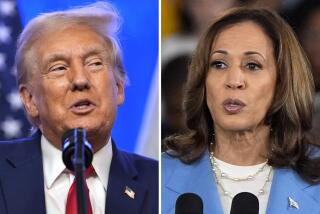Obama’s team gets a reality check
WASHINGTON — Now that the confetti has fallen, the nascent administration of Barack Obama has come face to face with one of its biggest challenges: living up to the exceptionally high expectations his thrilling campaign produced among supporters and long-suffering Democrats.
At his transition team’s first public briefing Tuesday, the audience was wildly outsized for the presentation by the transition chief, owlish think-tank denizen John Podesta.
Reporters flooded the meeting room, and 300 called in to listen by telephone.
What did they learn? News of Obama’s economic plans, his healthcare overhaul and the big issues that dominated the campaign?
No.
Disciplined and cautious as the Obama campaign itself, Podesta did not tip his hand on the big picture. He stuck to one of the few things Obama can quickly control: his own staff. Podesta announced new rules governing lobbyists who work on the transition staff.
So it goes as Obama makes the rocky transition from campaigning to governing.
While campaigning, he frequently decried the polarizing politics of years past.
“I am in this race because I don’t want to see us spend the next year re-fighting the Washington battles of the 1990s,” he said in a typical speech in South Carolina a year ago. “I don’t want this election to be about the past, because if it’s about the future, we all win.”
But his government-in-waiting is rife with officials from the Clinton administration. Podesta was a senior Clinton White House aide, as was Obama’s choice for chief of staff, Rep. Rahm Emanuel (D-Ill.).
Warren Christopher, who served as President Clinton’s first secretary of State and is a partner at the law firm of O’Melveny & Myers in Los Angeles, is heading up the transition for the State Department, and former Sen. Sam Nunn (D-Ga.) is preparing things at the Pentagon.
It’s starting to look as though Sen. Hillary Rodham Clinton’s family empire is living on, even though she lost the Democratic primary.
The high visibility of old hands and familiar faces underscores a tension that is already running through Team Obama: The president-elect has promised to overthrow Washington’s habits of partisanship and cronyism. But it’s tempting to turn to seasoned veterans to help him avoid the kinds of rookie mistakes that hobbled Clinton and President Carter. Both learned the hard way that a Congress controlled by the president’s party does not guarantee smooth sailing.
Not long ago, Obama derided the old Democratic establishment. A favorite line of attack was that Sen. Clinton (D-N.Y.) symbolized a certain kind of Washington insider.
On the campaign trail, Obama cast himself as a fresh-faced alternative. One stock line was: “It’s time to turn the page.”
In a speech last year in New Hampshire, the Illinois senator said: “There are those who tout their experience working the system in Washington. But the problem is that the system in Washington isn’t working for us and hasn’t for a long time.”
But with the campaign won, Obama seems eager not to repeat the mistakes of Democratic predecessors who left the party mandarins feeling marginalized.
Bill Clinton, a little-known Arkansas governor when he was elected president, had a hard time establishing rapport with the leaders on Capitol Hill -- and alienated them when he produced his major healthcare initiative after only scant consultation with the likes of Rep. John D. Dingell (D-Mich.), powerful chairman of the committee that oversaw the issue.
The result: Clinton’s healthcare proposal never came up for a vote, even in a subcommittee. His budget was approved by the narrowest of margins, with no Republican support. Two years after Clinton won the Oval Office, his party lost control of Congress, in the GOP midterm landslide of 1994.
Carter also ruffled feathers on Capitol Hill, by attacking and vetoing public works projects that he considered wasteful pork-barrel spending.
Emanuel is well-equipped to build bridges to Capitol Hill Democrats. He has been a member of the House leadership and has accumulated chits from dozens of lawmakers whom he helped elect as Democratic Congressional Campaign Committee chairman in 2006.
But he is also seen as an edgy partisan from the Clinton years whose appointment seemed to undercut Obama’s call for a new brand of post-partisan politics.
To burnish Obama’s reformist credentials, Podesta on Tuesday rolled out what he billed as a tough set of ethics rules targeting professional lobbyists. But there was a loophole: Lobbyists could work on the transition as long as they stayed away from the policy areas that their lobbying involved.
As a candidate, Obama’s language when it came to lobbyists was far more emphatic. “I have done more to take on lobbyists than any other candidate in this race -- and I’ve won,” he said in the South Carolina speech. “I don’t take a dime of their money, and when I am president, they won’t find a job in my White House.”
--
peter.nicholas@latimes.com
More to Read
Get the L.A. Times Politics newsletter
Deeply reported insights into legislation, politics and policy from Sacramento, Washington and beyond. In your inbox three times per week.
You may occasionally receive promotional content from the Los Angeles Times.











